
In today’s digital age, travel platforms need to provide comprehensive, seamless booking experiences to stay competitive.
Integrating Hotel APIs (Application Programming Interfaces) is one of the most powerful ways to enhance your platform’s functionality.
Whether you are running a travel website, app, or OTA (Online Travel Agency), hotel API integration can boost efficiency, increase inventory, and deliver a personalized customer experience.
This blog will explore how you can optimize your platform through hotel API integration, from choosing the right API to leveraging advanced features that drive growth.
Hotel API integration allows platforms to connect directly with hotel booking systems, inventory databases, and third-party hotel aggregators.
This enables seamless data exchange, allowing your platform to access live information on hotel availability, pricing, room types, and booking capabilities.
APIs work by sending and receiving data through standard protocols like REST or SOAP.
When integrated correctly, hotel APIs act as bridges between your platform and multiple hotel suppliers, consolidating data to offer your users a comprehensive range of hotel options without leaving your site or app.
Moreover, APIs allow for real-time updates, meaning your users can view the latest prices and availabilities, reducing booking errors and cancellations.
This technical integration becomes critical as users today expect accuracy, speed, and convenience when booking travel accommodations.
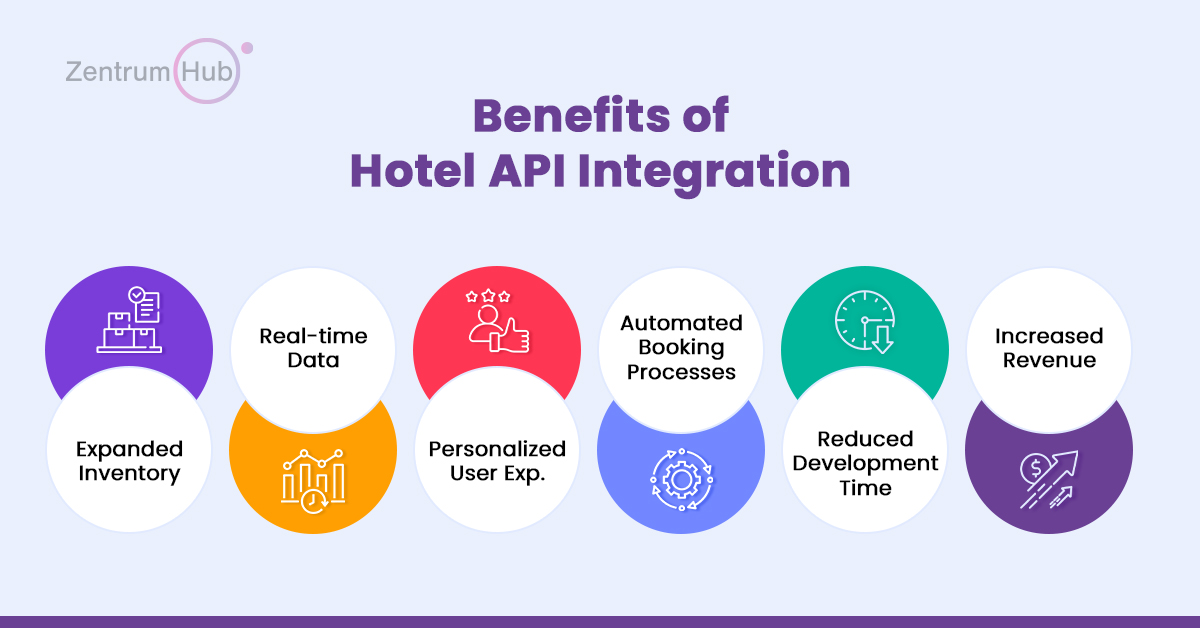
Hotel API integration goes beyond offering more hotels to your users. Here’s how it can significantly enhance your platform:
a. Expanded Inventory
By integrating with multiple APIs, you can access a global inventory of hotels, from major chains to independent boutique properties. This diversity enhances user choice, keeping them on your platform rather than pushing them to competitors with more options.
b. Real-time Data Synchronization
Hotel APIs ensure that the information on your platform is up-to-date. Real-time data prevents situations where users book unavailable rooms, improving user experience and minimizing cancellations.
c. Personalized User Experience
Through advanced filtering features, APIs allow you to offer personalized recommendations based on user preferences, history, and behavior. This level of customization is essential in today’s market, where users expect tailored suggestions.
d. Automated Booking Processes
With API integration, your platform can automate booking confirmations, payments, cancellations, and amendments. Automating these processes not only improves efficiency but also reduces the burden on customer support teams.
e. Reduced Development Time
Instead of building everything from scratch, integrating hotel APIs allows you to deploy new features faster. This approach ensures quicker time-to-market for new services and functionality.
f. Increased Revenue
With a broader inventory and personalized offerings, users are more likely to complete bookings, which directly translates into higher conversion rates and revenue for your platform. Dynamic pricing models and access to exclusive deals via APIs can also help boost profit margins.
Also Read Hotel API Integration Costs: Pricing Methods for OTAs Explained
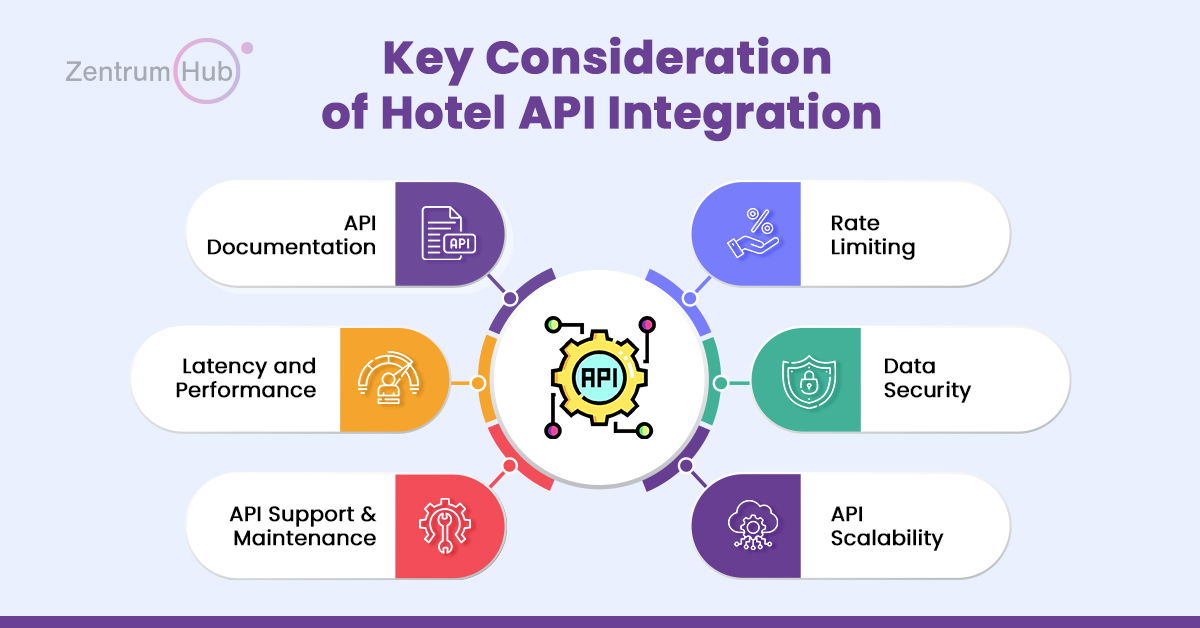
Before diving into API integration, several critical factors must be evaluated to ensure that the integration adds value rather than complexity:
a. API Documentation
Good API documentation is the backbone of any successful integration. Ensure that the provider offers comprehensive, easy-to-understand documentation that covers all endpoints, authentication methods, and error handling techniques.
b. Rate Limiting
Every API has a rate limit, which controls how many requests can be made within a specific timeframe. Understanding these limits is crucial, as exceeding them could lead to downtime or blocked requests during peak times. Choose a provider that offers flexible rate limits and scalable options as your platform grows.
c. Latency and Performance
Hotel APIs should be fast and reliable. High latency can negatively affect user experience, especially in regions where internet speeds are slower. Test the API’s performance across different geographical regions to ensure consistent user experience.
d. Data Security
As you handle sensitive customer information such as payment details and personal data, security should be a top priority. Verify that the API provider follows industry-standard encryption practices (like SSL/TLS), is GDPR-compliant, and has measures in place to prevent data breaches.
e. API Support and Maintenance
Ensure that your API provider offers strong technical support and regular updates. APIs evolve, and regular maintenance is essential to fix bugs, improve performance, and ensure compatibility with other services. Choose a provider that offers timely updates and responsive customer support in case issues arise.
f. Scalability
As your platform grows, the demand on your APIs will increase. Select a hotel API provider with scalable solutions that can grow alongside your platform without sacrificing performance or reliability.
Also Read Travel APIs: The Cost of Integration for OTAs
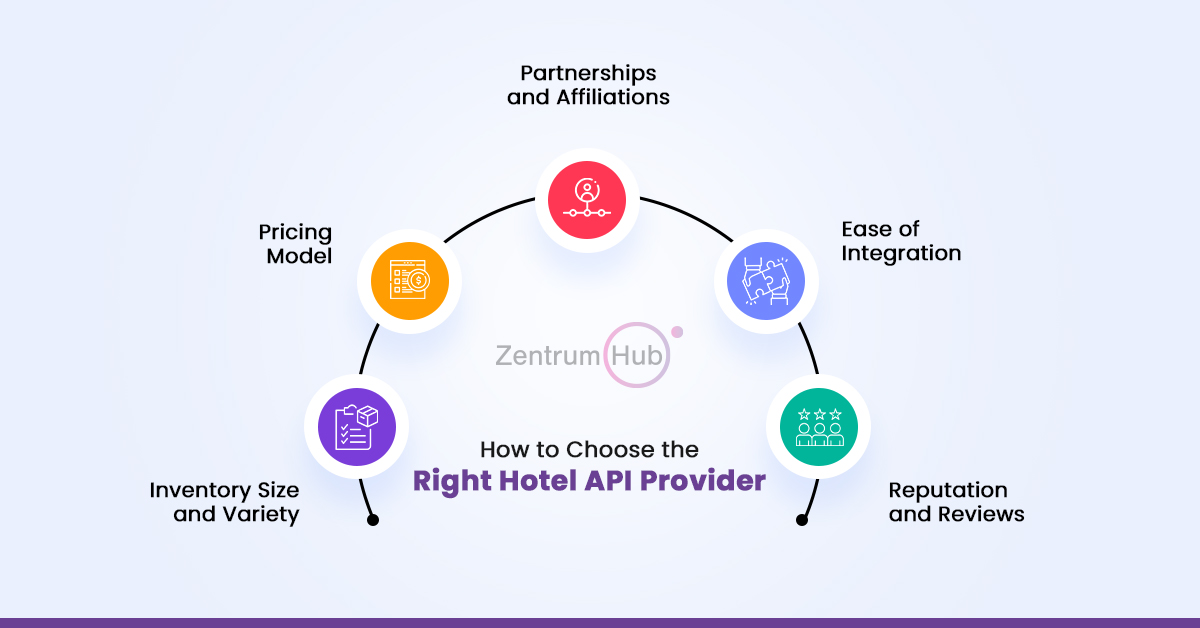
Selecting the right API provider can be overwhelming with so many options on the market. Here are some key factors to keep in mind when making your choice:
a. Inventory Size and Variety
Consider the size and variety of the hotel inventory. Some APIs specialize in specific regions or types of accommodations, such as luxury hotels, boutique stays, or budget-friendly options. Make sure that the provider’s inventory aligns with your target market and user expectations.
b. Pricing Model
API providers offer different pricing models—some charge per API call, while others charge a flat fee or take a commission per booking. Understand how these models will affect your revenue and costs, especially as your platform scales. Look for transparent pricing structures without hidden fees.
c. Partnerships and Affiliations
Top API providers often have partnerships with major hotel chains and distribution systems (e.g., Amadeus, Sabre). These partnerships can result in exclusive deals or more extensive coverage. Evaluate the provider’s affiliations to ensure access to high-quality inventory and competitive rates.
d. Ease of Integration
Check whether the API is easy to integrate with your existing system. Some APIs require extensive customization, while others offer plug-and-play functionality. Choose a provider with simple integration procedures and available SDKs (Software Development Kits) for faster deployment.
e. Reputation and Reviews
Don’t just rely on the provider’s sales pitch—check out reviews, case studies, and feedback from other platforms that have integrated the API. Hotel API provider with a solid track record of success can enhance your offerings.
Read More Challenges in Hotel API Integration and How to Overcome Them
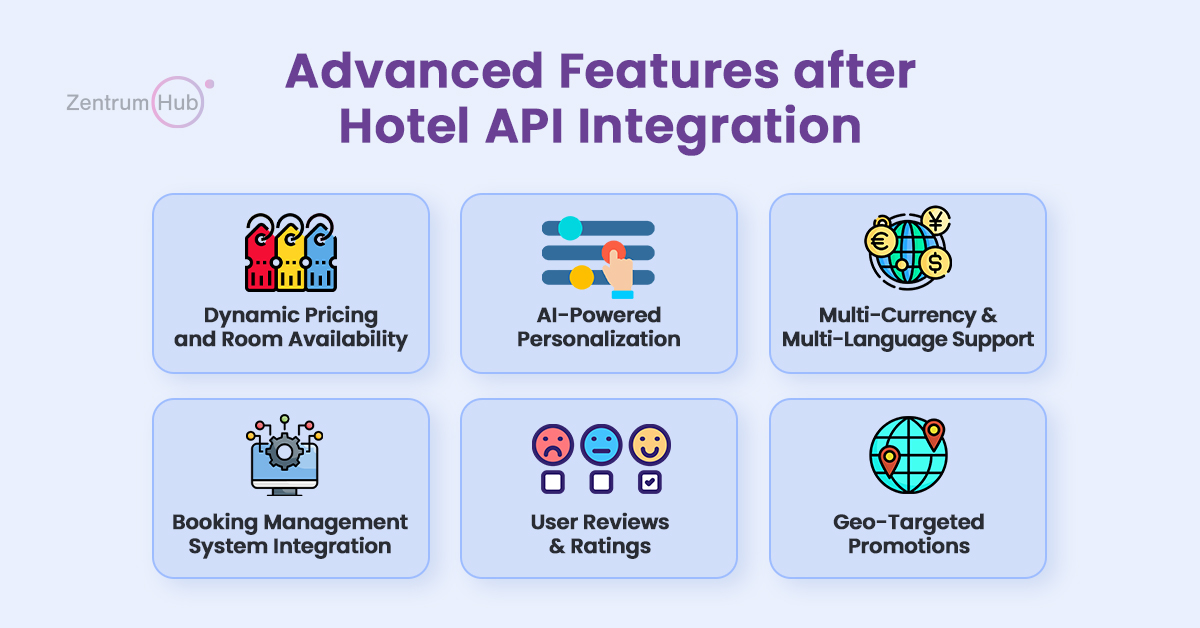
Once the integration is complete, it’s time to maximize the potential of hotel APIs. These advanced features can help you enhance the user experience, drive conversions, and stay ahead of competitors:
a. Dynamic Pricing and Room Availability
Some hotel APIs provide dynamic pricing models, allowing you to offer real-time discounts and promotions. By leveraging machine learning, you can analyze booking patterns to automatically adjust prices, ensuring competitive rates that attract more users.
b. AI-Powered Personalization
Use customer data from your platform to implement AI-driven recommendations. Personalization drives engagement and boosts conversion rates.
c. Multi-Currency and Multi-Language Support
For international users, integrating APIs that offer multi-currency and multi-language support is essential. Provide your customers with localized experiences to reduce friction during the booking process.
d. Booking Management System Integration
Integrating your hotel API with a booking management system can streamline cancellations, modifications, and refunds.
e. User Reviews and Ratings
If the API provides access to hotel reviews and ratings, displaying them on your platform can increase transparency and build trust. Users are more likely to book hotels with positive feedback, helping drive conversions.
f. Geo-Targeted Promotions
Leverage geo-location data to offer location-based promotions. For instance, you can offer special discounts to users searching for hotels in specific cities during peak travel seasons, which can drive demand.
Also Read How to Choose the Best Hotel API Provider? Key Features to Evaluate
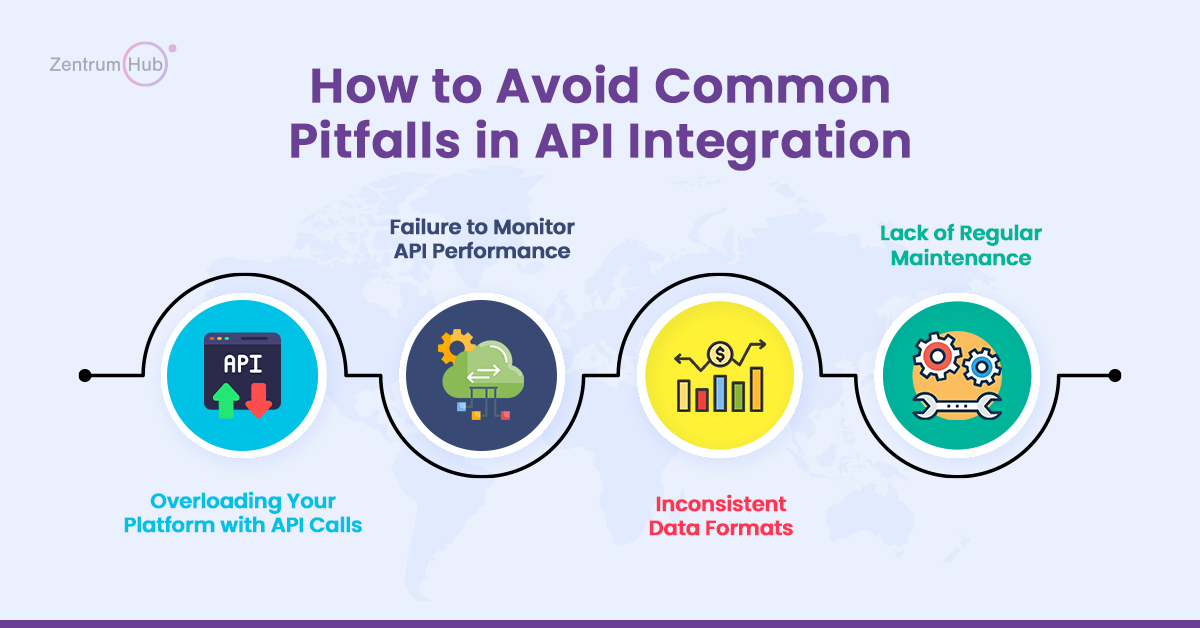
While hotel API integration offers numerous benefits, there are common challenges that you need to address:
a. Overloading Your Platform with API Calls
Making excessive API calls can slow down your platform and increase costs, especially if the provider charges per call.
b. Failure to Monitor API Performance
API downtime or latency can severely impact user experience. Implement monitoring tools to track the performance of your integrated APIs. Alerts should notify your team in real-time if issues arise so they can be resolved promptly.
c. Inconsistent Data Formats
Different APIs may use different data formats. Ensure that your development team handles these variations during the integration process, mapping them into a unified format for smooth operation on your platform.
d. Lack of Regular Maintenance
APIs are not static, and ignoring updates can lead to broken functionality. Regularly check for new versions, bug fixes, and security updates to keep your platform running smoothly.
a. Expedia’s API Integration Success
Expedia uses multiple hotel APIs to aggregate inventory from around the world, ensuring that their users have access to the most diverse range of hotels. By incorporating dynamic pricing models and personalized recommendations, Expedia has seen a significant increase in conversion rates.
b. Booking.com’s Advanced Personalization
Booking.com leverages API integration to offer AI-powered personalized experiences. Through the integration of sophisticated hotel APIs, they deliver tailored recommendations based on user behavior and preferences, enhancing customer satisfaction and boosting loyalty.
c. TripAdvisor’s Use of Reviews in API Integration
TripAdvisor integrates APIs that include reviews, ratings, and photos directly from hotels. This approach provides users with comprehensive insights, boosting trust and driving higher engagement.
It’s crucial to select the right API provider, avoid common pitfalls, and leverage advanced features to maximize the benefits. By following the strategies outlined in this blog, your platform can offer a seamless, competitive, and engaging user experience that drives growth and customer loyalty.
